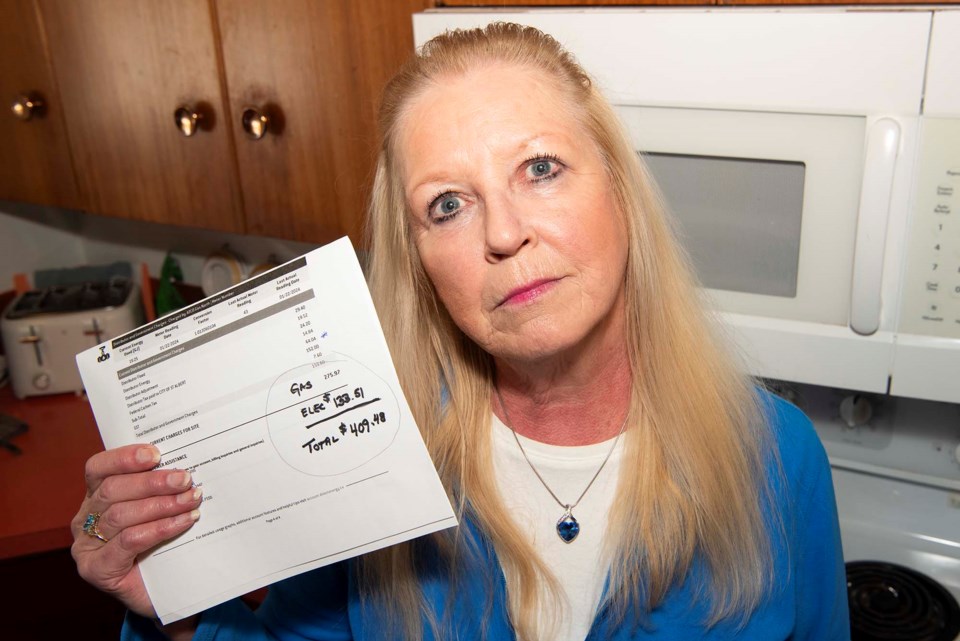Counting the cost
The Gazette is looking at how residents are dealing with the rising costs of living in St. Albert. If you have a question on why life is so expensive, email [email protected] so it can be answered in a future story.
Tina Doucette has become pretty frugal in recent years. The self-employed housekeeper has cut back on television and gardening, ditched her cell phone, cranked back the thermostat, put on sweaters and extra socks, and switched to a spray-bottle and a fan instead of an air conditioner just so she pay her bills.
“The rates have doubled,” she said of her power and gas bills, with the two of those costing her about $400 in January.
“I have gone over all my records, and I’m not using any more than I did in previous years.”
Despite these and other steps, Doucette said she has had to drain her retirement savings in the last four years to cover her expenses.
“Now it’s just, ‘eat’ and ‘have shelter.’”
Doucette, 64, is one of the many St. Albert residents that have reached out to the Gazette to talk about the high cost of living brought on by rampant inflation. In the months ahead, the Gazette will be looking at how those costs have changed people’s lives and what residents can do to make living more affordable.
Power spike
If you want to see inflation in action, look no further than your electricity bill.
Data from the Utilities Consumer Advocate shows the regulated rate for electricity in Alberta in February 2024 (as charged by Epcor) was about 18.3 cents per kilowatt-hour (kWh) — about 2.7 times higher than it was in February 2019 (about 6.8 cents/kWh).
Alberta’s wholesale prices for electricity jumped to $105 per megawatt-hour from $48 between 2020 and 2021, resulting in huge power bills, found economist Blake Schaffer and his team at of the University of Calgary. Schaffer found that about 40 per cent of this jump was caused by the construction of new power plants as companies shifted from coal to natural gas, a three per cent rise in demand, higher natural gas prices, and an increase in the provincial TIER carbon price. The remaining 60 per cent was due to the end of Alberta’s 20-year Power Purchase Arrangements in 2020. This concentrated control of generation into fewer hands and allowed companies to jack up prices.
Power savers
Chris Hunt works to help Albertans manage their utility costs as head of the Utilities Consumer Advocate (UCA). His office saves Albertans about $200 million a year by arguing against proposed power rate hikes at the Alberta Utilities Commission.
Hunt said his main advice to people struggling with power bills was to call the UCA’s Mediation Team at 310-4822. Agents offer free advice on how to reduce your energy use, find better rates, set up payment plans with your provider, and connect with emergency funding. The UCA also has a cost comparison tool you can use to find cheaper power plans.
Next comes conservation, said Gordon Howell, a renewable energy specialist in Edmonton.
“Turn down the heat in the house and put on a sweater,” he said, and shut off lights when you’re not in the room.
Anything you own that has a power adapter/brick drains power as long as it’s plugged in, Howell noted. Unplug these when you’re not using them, or plug them into a power bar and turn it off.
“If you’ve got 10 of those plugs in the house, it really surprising how fast it adds up.”
Next comes efficiency. Use a device like a Kill-A-Watt meter (available in the St. Albert Public Library’s HEAT Kits) to identify which of your appliances uses the most power, then seek out the most efficient replacement you can find. Howell said old fridges and non-LED-lights are prime targets for upgrades and have very quick paybacks.
Governments can take other actions. The Alberta government gave out electricity rebates from July 2022 to April 2023, for example, and capped the regulated rate option for electricity from January to March 2023. It also used to offer rebates for energy-efficient items through Energy Efficiency Alberta — rebates it cancelled in 2020.
St. Albert’s Clean Energy Improvement Program (CEIP) can help residents get some LED lights for no money down and pay for them over time through property taxes, and was still open for applications as of mid-February 2024. CEIP also covers solar panels, which can cut your bills significantly by tapping into free sun power.
Hunt said the province needs to update its electricity laws to address high power prices. Many of those laws are 20 years old and don’t account for developments such as electric cars. Government officials have expressed an interest in revising those laws, but there is considerable debate among analysts as to what reforms to introduce.
Doucette said she would like to see the province cap electricity rates once again. In the meantime, she’s worried what will happen when she has to renew her electricity contract.
“I’ve got another year, and I’m terrified to see what (the rate) is going to be if something isn’t done by our government,” she said.




